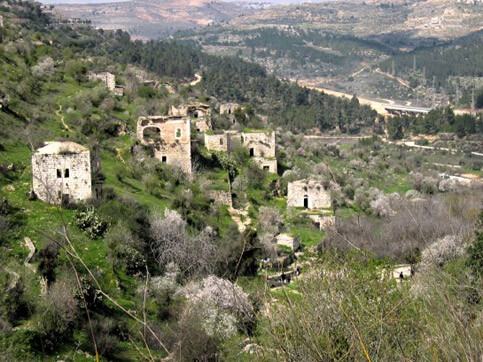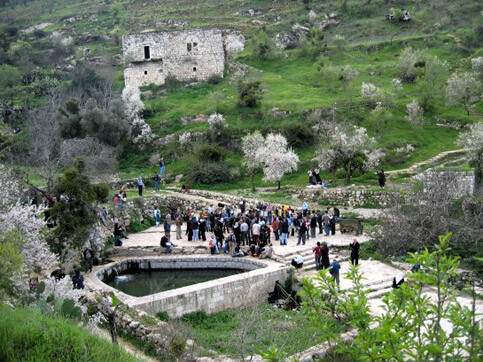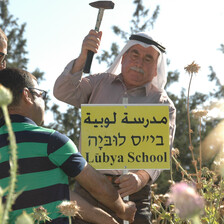The Electronic Intifada 3 June 2005

The ethnically cleansed Palestinian village of Lifta. In february 1948, Zionist forces occupied Lifta. The village was mostly destroyed with the exception of few houses and a mosque.
The Zochrot organization is devoted to introducing the Palestinian Nakba into the discourse of Jews in Israel, in order to achieve accountability for the tragedy of 1948. This accountability is a necessary condition of reconciliation between Israelis and Palestinians. Through its activities, Zochrot is trying to create contact, a meeting, between Palestinian internal refugees from a particular village and the Jews who live on the land of the same village. In the course of Zochrot`s efforts to recruit Jews to participate in this sort of meeting, we met a Jewish woman, a teacher, who lives in an Arab house in a village that has been reinhabited by Jews after the Nakba. She showed interest in the possibility of a meeting between her Jewish neighbors and the Palestinian exiles from the village in which she lives, and even intitiated a number of meetings with them at various opportunities in which she spoke of the possibility of the focused meeting that we are suggesting. After correspondence and discussions between us about the possibility of setting up such a meeting in order to discuss the meaning of the events of 1948, she wrote me the following brief note: `I came with my students to visit his village. Afterwards, he came to speak to them at school. It is strange how close we have become. He is no longer a threat to me. I am interested in setting up visits at our place with refugees` (My emphasis).
In the individual case of this woman, the Palestinian refugee is very close to her, since she lives in a house in the village in which he was born before 1948. But this is our situation more generally as Jews living in Israel. We all live in the land in which most of the residents and most of the communities were, until 1948, Palestinian. Most of the land was owned by Palestinians until 1948, and since the founding of the state it has passed into Jewish hands. Thus our collective situation is similar to that of this Jewish woman. I would therefore like to read the note above as a metonym for the relationship of Jews in Israel to the Palestinain refugees.
My argument is that the relationship of Jews in Israel to the Palestinian refugees is founded on this axis between closeness and the sense of threat. Very close, too close, and in spite of this, or rather because of it, it is so threatening. The closeness seems to be inevitable. The Israeli Jew and the refugee belong here. Indeed, in very different ways, but both have a sense of belonging to the place, often to the very same geographical site. The Israeli Jew has a sense of ownership of the land and a high degree of intimacy with the culture, the language, that was created here since the founding of the state, while the Palestinian refugee longs for his own place, feels uprooted from his place as a result of what he can only see as a violent and immoral act, that intensifies his sense of connection to this place, to Palestine. For the Israeli Jew the similarity of his sense of connection to that of the Palestinian is a sort of zero-sum game, something that creates a sense of threat. But this threat, implied by the attitude of `him or me,` assumes a great attachment. For the Israeli Jew the Palestinian refugee wants what he himself has. And that is very close. Too close.
But the threat that the Israeli Jew senses from the Palestinian refugee is not only due to an open struggle over the same piece of land. I will try to show here that this threat exists due to what we can call the essential impossibility of the Palestinian refugee for the Jew who lives here. The figure of the Palestinian refugee personifies the link of a concrete individual to the land in which we live. This individual is the other but he is from here, he belongs here. This link between the `other` and `from here` for the Jewish Israeli can only be a kind of existential threat that disturbs the order of things. If I, and only I, am from here, then there cannot be someone else who is from here as well. If the collective Jewish Israeli `I` is the exclusive master here, as is expressed in the laws and culture of the Jewish state, then there can`t be someone else from here. Certainly not a Palestinian other who is in fact defined to this day as the enemy of the Israeli Jews.
For the same Palestinian, if he is a resident of the place and also a second-class citizen of the Jewish State, he at least has certain usage rights to the benefits and services of the state. But, by definition, it is not his state. And thus the refugee in exile as well as the refugee who is an Israeli citizen, the internal displaced person, is an impossible figure for the Israeli, except as a threat that must be expelled. There is no chance within the paradigm of the Jewish state to even discuss the existence of the Palestinian refugee. Any discussion of this matter can at best only approach the boundaries of the territories occupied in 1967. In other words, the Palestinian refugee can find a solution and remedy for his situation in the geographic frame beyond the borders established in 1949. He cannot intrude beyond them into the territory of 1948, because the Jewish state was established there, and he has no citizenship status equal to that of the Jew, the owner.
In the first days of the state there were still different kinds of representations of the Palestinian refugees in Israeli culture, for instance, Janko, who painted Palestinian refugees and S. Yizhar, who wrote about the refugees and the Nakba. But with time the Palestinian refugee was pushed beyond the bounds of consciousness of the Jewish majority. This might be seen as a way of distancing of what is too close. Maybe the distancing and repression of the refugees is a conscious and unconscious response to their intolerable attachment to the land. They came out of here, they were in these houses, some of which stand today and contain others who have taken their place. In a broader sense the Palestinian collective was forced to leave, and their place was filled by Jews who were brought from other countries.
But this is not the basis of the impossibility of the Palestinian refugee. He is also impossible due to the view/blindness of the Jews in Israel, whose country, founded in 1948, is not responsible for what happened to the Palestinian refugees. The events that took place here and created `the refugee problem` preceded the establishment of the state. This state is the result of those events, and not their cause. The creation of the Jewish state, understood as a historical necessity, as a natural course of action due to the historical right of Jews over their land, and due to the holocaust in Europe. The Palestinian Arabs, as for as the Jews here are concerned, are those who tried to prevent this act and therefore lost any standing as someone to whom the state owes a debt. Every Jew in Israel knows how to recite the argument that they rejected the partition decision of the UN, and thus are responsible for everything that happened afterwards. The systematic and sweeping expulsion of the majority of the Palestinians from their land, from hundreds of communities, many of which put up no resistance, is attributed to `the war of liberation` and not to an ethnic cleansing, the goal of which was to rule over the maximum territory with a minimum of Arab residents within it. Recognition of this injustice requires assuming responsibility for its redress, and therefore, it seems, is so difficult to acknowledge it.

A basin that had been built around the spring in Wadi al-Shami lies in ruins. The mosque and the village club are still visible, north of the spring. Adjacent to the mosque, on the western side, is a cemetery covered with bushes and wild grass.
This ethnic cleansing, the Palestinian nakba, is something that can be seen as an event that never happened. Despite the continually accumulating evidence, in Hebrew as well, from the point of view/blindness of the Israeli Jews, it can`t be that almost an entire people was expelled from here, from the land of Israel. This was, after all, `an empty land, a wilderness, without a people, that waited for the return of the people without a land.` Thus our view of the past is afflicted with a structured blindness to what existed here before the state was established. It was this structured blindness that afflicted the painter Yosef Zaritsky in the seventies and eighties when he painted the area of Tzova. Larry Abramson showed us later that from the place where Zaritsky sat to paint the landscape, he could have seen the remains of the Palestinian village of Tzova that was conquered in 1948, but which nonetheless do not appear in his paintings. The village was there, even when Zaritsky painted the landscape, but he didn`t see it, or chose not to see it. In any case, it is missing. Did the view of the Arab village turn into a wilderness, a void, even when it was present? Zaritsky created a kind of absent presence just like the internal refugees that became absent even while they were present in the country. The official absence of the refugees overrides their concrete presence.
The attachment of the Jew in Israel to the Palestinian refugee returns here as a weighty pendulum. `The people without a land` is what we, the Israeli Jews, were, according to the hegemonic collective memory. And suddenly the Palestinian refugees were the people without a land. This is very disturbing, especially in light of our own connection to the creation of the Palestinian refugee problem. To a large extent, the Palestinians became the Jews` successors to refugee status, they actually confiscated the refugee status from us(!). The sense of Jewish persecution that is so developed in the Israeli Jews, weakens whenever the Palestinian refugees manage to show that they are in fact the victims and the refugees of the conflict in which we live. The Zionist narrative according to which the Jewish people are refugees from their land fits the Palestinian refugees. Look closely at this quote: `After the people were exiled from their land by force, they remained faithful to it in all the countries of their dispersion, never ceasing to pray and hope for their return and the restoration of their national freedom.` This is a quote from Israel`s declaration of independence, and it is well known to almost every Israeli Jew. Couldn`t this wording also fit any declaration of the Palestinian exile? Granted, there will be those who argue that the Palestinians cannot `restore their national freedom` since they never had it, but there is no need to prove that the prior Jewish sovereignty in the land has little in common with that at present. Not only because the modern nation state is something totally different from the ancient political structure, but because the present connection of the Jewish people, who imagine themselves to be the continuation of the ancient Jewish people, is the result of a national project of projecting itself into the past. In other words, the ancient Jewish sovereignty is a result of the contemporary sovereignty, and not the reverse, according to the anachronistic perception of nationalism, by which the people were created from something ancient and developed along a linear historic path.
But the Palestinian refugee doesn`t need too developed an imagination to know that he was `exiled by force from his land.` All he needs is a personal and collective memory of two or three generations. Some of the refugees that were actually expelled are still alive among us, and vividly remember the expulsion, and this memory weighs heavily on the Israeli Jew. Thus he would prefer that this memory would be silent, mute, so that we won`t hear it and that it will have difficulty being spoken. This is exactly the situation of the Arab in A.B. Yehosua`s short story, `Facing the Forests.` The Arab guard of the forest is mute and wanders in the forest as though possessed by a demon. Throughout the story it is clear to us that he is hiding an awful secret, but we don`t know what it is because he is mute. The `we` in the story is represented by a Jewish student who comes to the forest for a summer job. He senses that something is happening to the Arab guard but he can`t figure out what it is. He doesn`t know the history of the forest, when it was established, and what was there before. To a great extent, he resembles the Israelis who don`t know what is hidden beneath the many Jewish National Fund forests in Israel. The secret of the refugee is uncovered only when he sets the forest on fire and among the smoldering sticks are revealed the outlines of the village that was the Palestinian`s home until 1948. The secret of the Palestinain refugee, according to Yehoshua, is articulated only through the catastrophe of the great fire. As long as the forest is ours, and the JNF`s, standing erect, the secret of the refugee is hidden, mute. The discovery of the Palestinian refugee`s secret requires the destruction of our project, burning the forest that we have been taught to preserve, as part of `our nature.`
The student in `Facing the Forests` comes to the forest because he found some convenient temporary work there, so that he could write some term paper that he needed to complete for his studies. He is not really from the place. He doesn`t know its history. When an Arab family comes to visit the forest and is excited to find the remains of the village there, he doesn`t understand them, because he doesn`t speak the language of the land and he can`t imagine that once Palestinians lived there. The Jew lives in Israel with a sense of disconnection, since he has generally been here for only one or two generations. But it is not only the past of many Jews in Israel that is relatively short. Their future in the country often depends on whether they will manage to find a place with a better material standard of living. A suitable opportunity abroad is the heart`s desire of many Israelis, to `catch America.` They are here as long as they don`t find a place for advancing themselves abroad. The dream of the Palestinians to return to their land is something to be rejected, since it accentuates this detachment of the Israelis. This detachment of the Jew in Israel, that he has carried with him from the diaspora, is confronted by the Palestinain attachment, and the refugee`s dream of return.
The Palestinian refugee steals the joy that we seem to want in the land in which we live ó a national joy of a sense of natural and active belonging to this place. The refugee realizes the unattainable fantasy of the Israeli Jew to really belong here. The recognition of someone else`s belonging here awakens and accentuates the detachment of Jews here, as in every other place. This exilic nature, of not belonging to a place, is a kind of natural state for the Jew, and the mirror that the Palestinian refugee presents him is disconcerting.
The Palestinian refugees belong to an event that took place in a different time and place from that of the Jewish state. Being `Palestinians` they are by definition strangers to the space that is called `the land of Israel.` It is no wonder, however, that over many years the Palestinian people would completely cease to exist for most Israelis. And the time in which the Palestinians were exiled, 1948, has also become an `other` time, that is not really parallel to the corresponding chronological time - the year 5708, according to the Hebrew calendar. 1948 and 5708 are the same time but each one is the sign of a different collective. Thus, for instance, when you see a sign on the road near Moshav Dor pointing to a memorial for those who died in 5708, no one imagines that the memorial commemorates the victims of the massacre at Tantura. Those who died in 5708 are Jews who fought for the the creation of the Jewish state. The refugees of 1948, whose history begins from exactly the same point in time, come from a different cultural time that is alien to the Jews in Israel.
To conclude, the Palestinian refugee is a threatening figure for the Israeli Jews, since he awakens the demon of the original sin through which the Jewish state was established. His concrete existence, so close, raises the spirits of the dead that Jews in Israel would rather forget. Freedom from this fear, the possibility to approach and to know the Palestinian refugee, contains the potential for a great change for all the residents of this land.
Eitan Bronstein is founder of Zochrot (Remember) an organization that educates Israelis about the history of the Nakba in order to achieve accountability for the tragedy of 1948. This article first appeared in Occupation Magazine and was translated from Hebrew by Daniel Breslau. This article is reprinted on EI with permission.
Related Links




